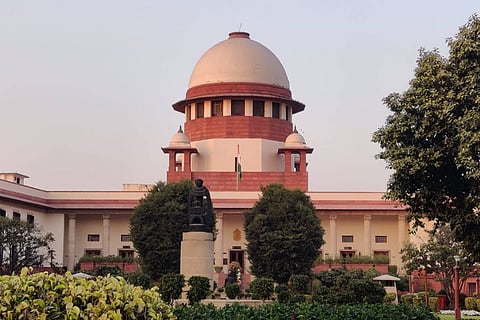

The Supreme Court on Saturday set up a 12-member National Task Force (NTF) to facilitate public health response to COVID-19, including streamlining of oxygen distribution in the country, based on scientific and specialised domain knowledge.
A bench comprising Justices DY Chandrachud and MR Shah said, "A consensus has emerged that there is a need to ensure that the allotments of medical oxygen to the states and UTs are made on a scientific, rational and equitable basis. At the same time, it must allow for flexibility to meet unforeseen demands due to emergencies which may arise within the allocated territories."
The top court said, "It is necessary that an effective and transparent mechanism is set up within the Union government for the purpose of allocating medical oxygen to all states and UTs for being used during the COVID-19 pandemic. The Union government has agreed to set up a National Task Force to streamline the process. This Task Force would be tasked inter alia with formulating a methodology for the scientific allocation of oxygen to the states and UTs."
The SC bench said the establishment of this task force will enable the decision makers to have inputs which go beyond finding ad-hoc solutions to the present problems. "The likely future course of the pandemic must be taken into contemplation at the present time. This will ensure that projected future requirements can be scientifically mapped in the present and may be modulated in the light of experiences gained," said the bench.
"The rationale for constituting a task force at a national level is to facilitate a public health response to the pandemic based on scientific and specialised domain knowledge. We expect that the leading experts in the country shall associate with the work of the task force both as members and resource persons," the top court noted in its order.
The bench added, "The Union government has made its suggestions on the possible names for inclusion in the composition of the task force, while leaving its final composition to the court.”
The National Task Force shall consist of the Dr Bhabatosh Biswas, Former Vice Chancellor, West Bengal University of Health Sciences, Kolkata, Dr Devender Singh Rana, Chairperson, Board of Management, Sir Ganga Ram Hospital, Delhi, Dr Devi Prasad Shetty, Chairperson and Executive Director, Narayana Healthcare, Bengaluru, Dr Gagandeep Kang, Professor, Christian Medical College, Vellore, Tamil Nadu, Dr JV Peter, Director, Christian Medical College, Vellore, Tamil Nadu, Dr Naresh Trehan, Chairperson and Managing Director, Medanta Hospital and Heart Institute, Gurugram, Dr Rahul Pandit, Director, Critical Care Medicine and ICU, Fortis Hospital, Mulund (Mumbai) and Kalyan (Maharashtra) and Dr Saumitra Rawat, Chairman & Head, Department of Surgical Gastroenterology and Liver Transplant, Sir Ganga Ram Hospital, Delhi.
Other members of the committee include Dr Shiv Kumar Sarin, Senior Professor and Head of Department of Hepatology, Director, Institute of Liver and Biliary Science (ILBS), Delhi, Dr Zarir F Udwadia, Consultant Chest Physician, Hinduja Hospital, Breach Candy Hospital and Parsee General Hospital, Mumbai and a Secretary, Ministry of Health and Family Welfare, Government of India (ex officio member).
“The Convenor of the National Task Force, who shall also be a member, will be the Cabinet Secretary to the Union Government. The Cabinet Secretary may nominate an officer not below the rank of Additional Secretary to depute for him, when necessary," the order stated. The top court said the task force is at liberty to draw upon the human resources of the Union government for consultation and information.
"The establishment of this task force will enable the decision makers to have inputs which go beyond finding ad-hoc solutions to the present problems. The likely future course of the pandemic must be taken into contemplation at the present time," the top court added.